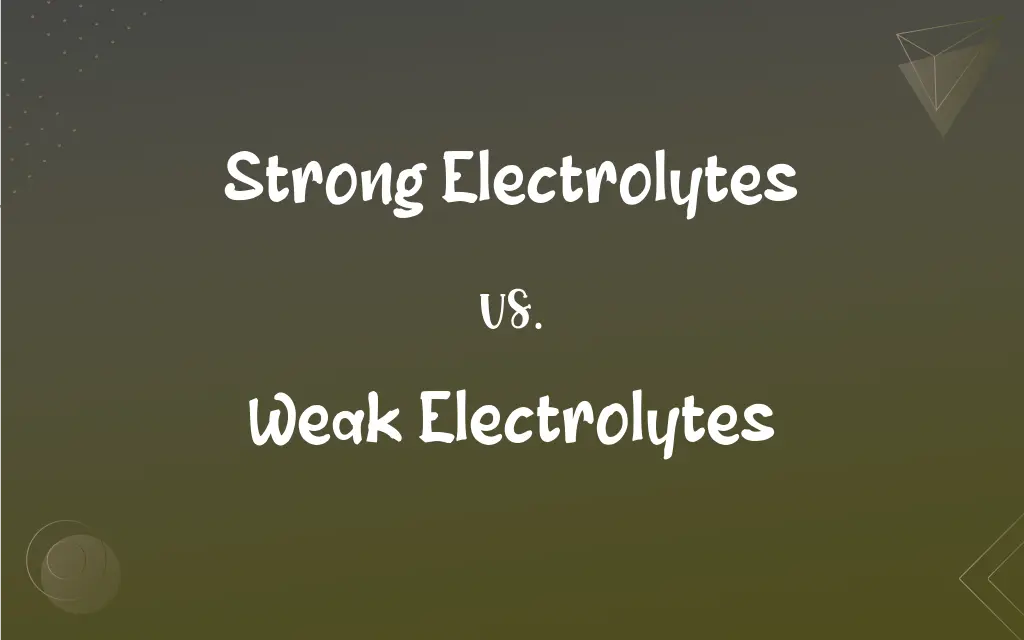Strong Electrolytes vs. Weak Electrolytes: What's the Difference?
By Janet White || Published on January 8, 2024
Strong electrolytes completely dissociate into ions in solution, providing high conductivity, while weak electrolytes partially dissociate, resulting in lower conductivity.

Key Differences
Strong electrolytes are substances that, when dissolved in water, completely dissociate into ions, resulting in a solution that conducts electricity very well. Weak electrolytes, however, only partially dissociate into ions in solution, leading to a lower degree of electrical conductivity.
Examples of strong electrolytes include most salts, strong acids, and strong bases, which ionize fully in solution. Weak electrolytes include weak acids and bases, which do not fully ionize, contributing fewer ions to the solution.
The high ion concentration in strong electrolytes makes them efficient in conducting electricity, used in applications like batteries and electrolysis. Weak electrolytes, with their lower ion concentration, have limited conductivity and are less efficient in such applications.
Measuring the electrical conductivity of a solution can indicate whether an electrolyte is strong or weak; higher conductivity suggests a strong electrolyte. In contrast, weak electrolytes show reduced conductivity due to the incomplete dissociation of their molecules.
Strong electrolytes typically exhibit a one-to-one ratio of dissociated ions to original molecules, whereas weak electrolytes have a lower ratio, indicating incomplete ionization.
ADVERTISEMENT
Comparison Chart
Dissociation in Water
Complete dissociation into ions
Partial dissociation into ions
Electrical Conductivity
High due to full ionization
Lower due to partial ionization
Examples
Most salts, strong acids, and strong bases
Weak acids and bases
Ion Concentration
High, contributing to efficient conductivity
Lower, resulting in limited conductivity
Molecular Ratio
One-to-one ratio of ions to original molecules
Lower ratio of ions to original molecules
ADVERTISEMENT
Strong Electrolytes and Weak Electrolytes Definitions
Strong Electrolytes
Strong electrolytes are substances that fully dissociate into ions in solution.
Sodium chloride is a strong electrolyte that dissociates completely in water.
Weak Electrolytes
They are often used in chemistry for reactions where controlled ion concentration is needed.
Weak electrolytes are preferred in titration experiments for precise measurements.
Strong Electrolytes
Strong electrolytes include most ionic compounds such as salts.
Table salt, a common strong electrolyte, ionizes in water to form sodium and chloride ions.
Weak Electrolytes
Weak electrolytes partially dissociate into ions in a solution.
Acetic acid is a weak electrolyte, only partially ionizing in water.
Strong Electrolytes
Strong electrolytes provide a high concentration of ions in solution.
Sulfuric acid, a strong electrolyte, produces a high ion concentration when dissolved.
Weak Electrolytes
Weak electrolytes demonstrate a lower ratio of dissociated ions to molecules.
Hydrofluoric acid, as a weak electrolyte, does not fully dissociate in solution.
Strong Electrolytes
They are often used in chemical and electrochemical applications.
Strong electrolytes are essential in the functioning of batteries.
Weak Electrolytes
They conduct electricity less efficiently due to incomplete ionization.
Weak electrolytes like ammonia result in lower conductivity in solution.
Strong Electrolytes
They are characterized by their ability to conduct electricity efficiently in solution.
In electrolysis experiments, strong electrolytes like potassium iodide are used.
Weak Electrolytes
Weak electrolytes include many organic acids and bases.
Vinegar, containing acetic acid, is a common household weak electrolyte.
FAQs
Why do weak electrolytes conduct electricity poorly?
Due to their lower ion concentration from partial dissociation.
How do weak electrolytes behave in solution?
They partially dissociate into ions.
Can strong electrolytes conduct electricity well?
Yes, due to their high ion concentration.
Are all salts strong electrolytes?
Most salts are, but there are exceptions.
Does pH change with weak electrolyte concentration?
Yes, due to the partial ionization of weak electrolytes.
Can weak electrolytes be used in batteries?
They're less effective due to lower conductivity.
Do strong acids fall under strong electrolytes?
Yes, strong acids are strong electrolytes.
Can weak electrolytes be fully ionized?
No, they only ionize partially.
Are weak bases considered weak electrolytes?
Yes, they partially dissociate in solution.
Can you name a weak electrolyte?
Acetic acid, found in vinegar, is a weak electrolyte.
What defines a strong electrolyte?
A substance that completely dissociates into ions in solution.
Is distilled water a strong electrolyte?
No, it's not an electrolyte at all.
How does concentration affect weak electrolytes?
Higher concentrations may slightly increase ionization.
Are all strong electrolytes ionic compounds?
Most are, but there are some covalent exceptions.
What's an example of a strong electrolyte?
Sodium chloride (table salt) is a common example.
Do weak electrolytes affect electrical circuits?
They can, but less effectively than strong electrolytes.
Can strong electrolytes be used in electroplating?
Yes, due to their high electrical conductivity.
How does temperature affect strong electrolytes?
It can increase ion mobility, enhancing conductivity.
Are electrolytes important in the human body?
Yes, they're crucial for various physiological functions.
Are there health risks with strong electrolytes?
In high concentrations, they can be harmful if ingested.
About Author
Written by
Janet WhiteJanet White has been an esteemed writer and blogger for Difference Wiki. Holding a Master's degree in Science and Medical Journalism from the prestigious Boston University, she has consistently demonstrated her expertise and passion for her field. When she's not immersed in her work, Janet relishes her time exercising, delving into a good book, and cherishing moments with friends and family.






































































